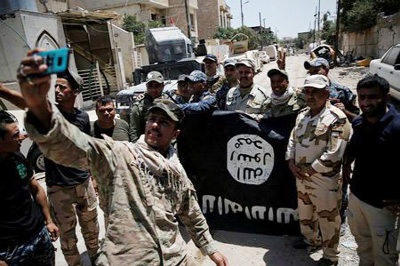
Reuters, Mosul :
Islamic State militants began reinventing themselves months before U.S.-backed Iraqi forces ended their three-year reign of terror in Mosul, putting aside the dream of a modern-day caliphate and preparing the ground for a different fight.
Intelligence and local officials said that, a few months ago, they noticed a growing stream of commanders and fighters flowing out of the city to the Hamrin mountains in northeast Iraq which offer hideouts and access to four Iraqi provinces. Some were intercepted but many evaded security forces and began setting up bases for their new operations.
What comes next may be a more complex and daunting challenge for Iraqi security forces once they finish celebrating a hard-won victory in Mosul, the militants’ biggest stronghold. Intelligence and security officials are bracing for the kind of devastating insurgency al Qaeda waged following the 2003 U.S.-led invasion, pushing Iraq into a sectarian civil war which peaked in 2006-2007.
“They are digging in. They have easy access to the capital,” Lahur Talabany, a top Kurdish counter-terrorism official, told Reuters. As part of the U.S.-led coalition, he is at the forefront of efforts to eliminate Islamic State.
Some Iraqi Islamic State fighters have roots dating back to al Qaeda’s campaign of car and suicide bombs that exploded by the dozens each day and succeeded in fueling a sectarian bloodbath in Iraq, a major oil producer and key U.S. ally. When a U.S.-funded tribal initiative crushed al-Qaeda, the hardcore regrouped in the desert between Iraq and Syria. They reappeared with a new jihadist brand that took the world by surprise: Islamic State. Shortly after its lighting sweep through Mosul, the group outdid al Qaeda’s brutality, carrying out mass beheadings and executions as it imposed its ultra-hardline ideology.
Unlike al-Qaeda, it seized a third of Iraqi territory, gaining knowledge of land that could come in handy as it hits back at Iraqi security forces.
Former Iraq intelligence officers who served under Saddam Hussein joined forces with Islamic State in an alliance of convenience. These shrewd military strategists from his Baath Party are expected to be the new generation of Islamic State leaders, Talabany and other security officials said.
Islamic State militants began reinventing themselves months before U.S.-backed Iraqi forces ended their three-year reign of terror in Mosul, putting aside the dream of a modern-day caliphate and preparing the ground for a different fight.
Intelligence and local officials said that, a few months ago, they noticed a growing stream of commanders and fighters flowing out of the city to the Hamrin mountains in northeast Iraq which offer hideouts and access to four Iraqi provinces. Some were intercepted but many evaded security forces and began setting up bases for their new operations.
What comes next may be a more complex and daunting challenge for Iraqi security forces once they finish celebrating a hard-won victory in Mosul, the militants’ biggest stronghold. Intelligence and security officials are bracing for the kind of devastating insurgency al Qaeda waged following the 2003 U.S.-led invasion, pushing Iraq into a sectarian civil war which peaked in 2006-2007.
“They are digging in. They have easy access to the capital,” Lahur Talabany, a top Kurdish counter-terrorism official, told Reuters. As part of the U.S.-led coalition, he is at the forefront of efforts to eliminate Islamic State.
Some Iraqi Islamic State fighters have roots dating back to al Qaeda’s campaign of car and suicide bombs that exploded by the dozens each day and succeeded in fueling a sectarian bloodbath in Iraq, a major oil producer and key U.S. ally. When a U.S.-funded tribal initiative crushed al-Qaeda, the hardcore regrouped in the desert between Iraq and Syria. They reappeared with a new jihadist brand that took the world by surprise: Islamic State. Shortly after its lighting sweep through Mosul, the group outdid al Qaeda’s brutality, carrying out mass beheadings and executions as it imposed its ultra-hardline ideology.
Unlike al-Qaeda, it seized a third of Iraqi territory, gaining knowledge of land that could come in handy as it hits back at Iraqi security forces.
Former Iraq intelligence officers who served under Saddam Hussein joined forces with Islamic State in an alliance of convenience. These shrewd military strategists from his Baath Party are expected to be the new generation of Islamic State leaders, Talabany and other security officials said.

